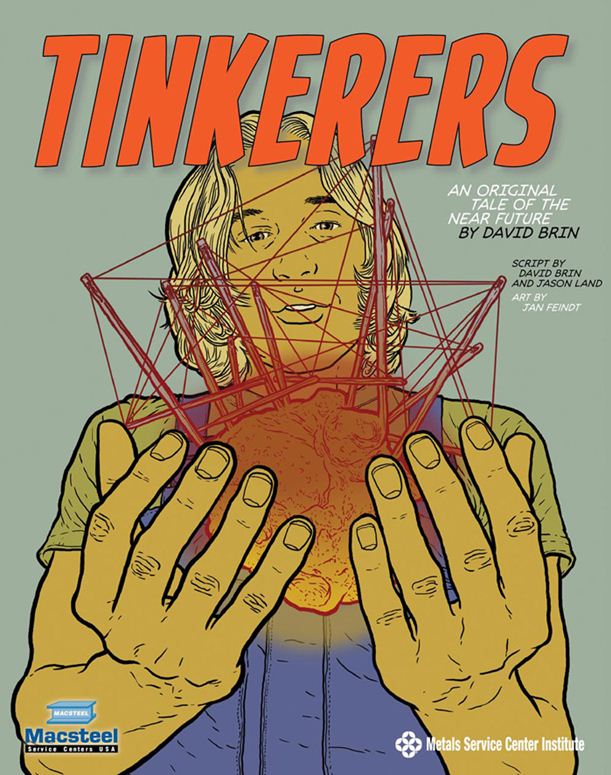Insights · December 10th, 2010

We recently received a Sneak Preview of David Brin’s short, new graphic novel titled Tinkerers. The novel explores US Industrial Decline and Resurrection and is “an original tale of the near futureâ€. Brin invites you to “imagine a nation that has lost its ability and desire to make thingsâ€. He walks you through one young man’s “quest to learn the reasons for decline even as he works to reverse it.â€
In my opinion, it’s a sadly truthful story with an inspiring conclusion. We need to focus on “a future when we fret less about blame, dogmas, or recriminations and care more about doing the next great thingâ€!
Please read the novel and find Tinkerers on Facebook to join the conversation.
Just this week I received an email forwarded from my surrogate grandfather about the changes and challenges facing America and what this means to us in real terms. (Although this came in an email, more information can be found at Business Insider and The American Prospect). Here is just part of his message:
The following are 19 facts about the deindustrialization of America that will blow your mind….
- The United States has lost approximately 42,400 factories since 2001. About 75 percent of those factories employed over 500 people when they were still in operation.
- Dell Inc., one of America’s largest manufacturers of computers, has announced plans to dramatically expand its operations in China with an investment of over $100 billion over the next decade.
- Dell has announced that it will be closing its last large U.S. manufacturing facility in Winston-Salem, North Carolina in November. Approximately 900 jobs will be lost.
- In 2008, 1.2 billion cell phones were sold worldwide. So how many of them were manufactured inside the United States? Zero.
- According to a new study conducted by the Economic Policy Institute, if the U.S. trade deficit with China continues to increase at its current rate, the U.S. economy will lose over half a million jobs this year alone.
- As of the end of July, the U.S. trade deficit with China had risen 18 percent compared to the same time period a year ago.
- The United States has lost a total of about 5.5 million manufacturing jobs since October 2000.
- According to Tax Notes, between 1999 and 2008 employment at the foreign affiliates of U.S. parent companies increased an astounding 30 percent to 10.1 million. During that exact same time period, U.S. employment at American multinational corporations declined 8 percent to 21.1 million.
- In 1959, manufacturing represented 28 percent of U.S. economic output. In 2008, it represented 11.5 percent.
- Ford Motor Company recently announced the closure of a factory that produces the Ford Ranger in St. Paul, Minnesota . Approximately 750 good paying middle class jobs are going to be lost because making Ford Rangers in Minnesota does not fit in with Ford’s new “global” manufacturing strategy.
- As of the end of 2009, less than 12 million Americans worked in manufacturing. The last time less than 12 million Americans were employed in manufacturing was in 1941.
- In the United States today, consumption accounts for 70 percent of GDP. Of this 70 percent, over half is spent on services.
- The United States has lost a whopping 32 percent of its manufacturing jobs since the year 2000.
- In 2001, the United States ranked fourth in the world in per capita broadband Internet use. Today it ranks 15th.
- Manufacturing employment in the U.S. computer industry is actually lower in 2010 than it was in 1975.
- Printed circuit boards are used in tens of thousands of different products. Asia now produces 84 percent of them worldwide.
- The United States spends approximately $3.90 on Chinese goods for every $1 that the Chinese spend on goods from the United States.
- One prominent economist is projecting that the Chinese economy will be three times larger than the U.S. economy by the year 2040.
- The U.S. Census Bureau says that 43.6 million Americans are now living in poverty and according to them that is the highest number of poor Americans in the 51 years that records have been kept.
I wish I had a way to fix all of our problems, but I do know that something needs to change. Like Brin said, lets stop playing the blame game and start coming up with some viable solutions.
Writer: Catherine Otten was a Program Manager and Administrator for Futurist.com in 2007 and again in 2010-2011. We lost her to cancer in 2016. An avid outdoors woman and mountain climber, Catherine was especially passionate about the environment.

